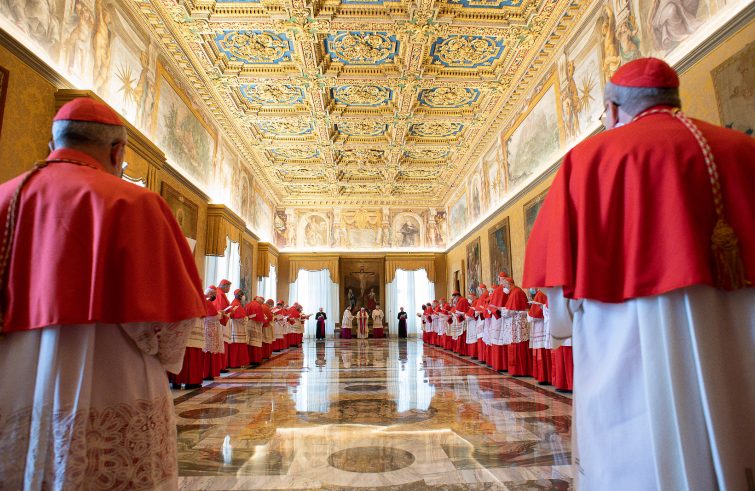
By surprise and addressing the faithful directly – as he has accustomed us to throughout his almost ten years of pontificate – on the conclusion of the Regina Caeli prayer for the Solemnity of the Ascension of the Lord Pope Francis announced that on August 27 next he will hold his eighth Consistory, during which he will create twenty-one new cardinals, sixteen of whom will be cardinal-electors, that is, entitled to vote in the event of a Conclave. Faithful to his dictum whereby the cardinalate must not be viewed “as a prize, or the peak of one’s career” but as service to the universal Church in communion with the Successor of Peter, Bergoglio selected clerics from all corners of the world, prioritising, once again, the peripheries and not those considered traditional cardinal sees. As of August 27, the College of Cardinals will comprise 229 cardinals, 132 of whom are electors. With respect to the last three pontificates, the College will comprise 52 cardinals created by John Paul II (11 of whom are cardinal-electors); 64 created by Benedict XVI (38 of whom are electors) and 113 created by Francis (83 of whom are electors). In fact, as of the next Consistory the cardinals will be geographically distributed as follows: Europe – 107 cardinals, 54 of whom are electors; the Americas – 60 cardinals, 38 of whom are electors; Asia – 30 cardinals, 20 of whom are electors; Africa – 27 cardinals, 17 of whom are electors; and Oceania, 5 cardinals, 3 of whom are electors.
Two Italian cardinals are among the 16 new cardinal-electors announced by Pope Francis. They are:
Oscar Cantoni – the only resident cardinal – and Giorgio Marengo. The former, 71, born in Lenno, served for years as spiritual father at the Seminary of Como. He was appointed bishop in 2005 and took possession of the diocese of Crema on March 19, 2005. He serves as bishop of Como since October 5, 2016. He is currently assistant to the Delegate for the Seminaries of Italy. Bishop Giorgio Marengo, aged 48, will become the youngest member of the College of Cardinals. He was born in Cuneo on June 7, 1974. He served as missionary in Mongolia and as regional councillor for Asia and superior of the order for Mongolia until his episcopal ordination. In April 2020, Pope Francis appointed him Apostolic Prefect of Ulan Bator and titular bishop of Castra Severiana. Three out of five Italian prelates are non-electors – owing to age limits they are not eligible to vote in a Conclave. Monsignor Arrigo Miglio, archbishop emeritus of Cagliari, born in the town of San Giorgio Canavese on 18 July 1942, had been particularly supportive of the miners since he was named bishop of Iglesias in 1993. He was named bishop of Ivrea in 1999 and served as president of the scientific committee and organizer of the Social Weeks of Italian Catholics. He was named archbishop of Cagliari by Pope Benedict XVI in 2012. On September 22, 2013, he welcomed Pope Francis on the occasion of the Holy Father’s visit to Bonaria. Following his resignation due to age limits in 2017, the Pope had reconfirmed him for another two years. Father Gianfranco Ghirlanda, S.J, born in Rome on July 5, 1942, served as rector of the Pontifical Gregorian University in Rome in the years 2004-2010. He currently serves as Pontifical Assistant for canonical matters relating to Memores Domini and is also following the update of the Constitution of the Sovereign Order of Malta. Monsignor Fortunato Frezza, born in 1942, served as Undersecretary of the Synod of Bishops, Ecclesiastical Assistant to the Doctors and Pharmacists of Vatican City and chaplain of Roma football club. He presently serves as a Canon of St Peter’s Basilica. The list includes Jorge Enrique Jiménez Carvajal, Archbishop Emeritus of Cartagena (Colombia); Lucas Van Looy, Archbishop Emeritus of Gent (Belgium).
Three of the new cardinal electors come from the Roman Curia. They are:
Arthur Roche, Prefect of the Congregation for Divine Worship and the Discipline of the Sacraments; Lazarus You Heung sik, Prefect of the Congregation for the Clergy; and Fernando Vérgez Alzaga, President of the Pontifical Commission for the Vatican City State and President of the Governorate of the Vatican City State. The third European prelate to be made cardinal elector is Msgr. Jean Marc Aveline, Metropolitan Archbishop of Marseille. Two Indian prelates will be elevated to the cardinalate: Archbishop of Goa and Daman Filipe Neri António Sebastião do Rosário Ferrão and Msgr. Anthony Poola, Archbishop of Huyderabad. Asia is also represented by Msgr. William Goh Seng Chye, Archbishop of Singapore, and Msgr. Virgilio Do Carmo Da Silva, Archbishop of Dili, in East Timor.
Nigeria and Ghana are, respectively, the countries of origin of the two new African cardinals: Msgr. Peter Okpaleke, Bishop of Ekwulobia and Msgr. Richard Huuia Baawobr. North America is represented by Msgr. Robert Walter McElroy, bishop of San Diego, while there are three Latin American bishops: Leonardo Ulrich Steiner, metropolitan archbishop of Manaus, Brazil, Paulo Cesar Costa, metropolitan archbishop of Brasilia, and Adalberto Martinez Flores, metropolitan archbishop of Asuncion, Paraguay.










